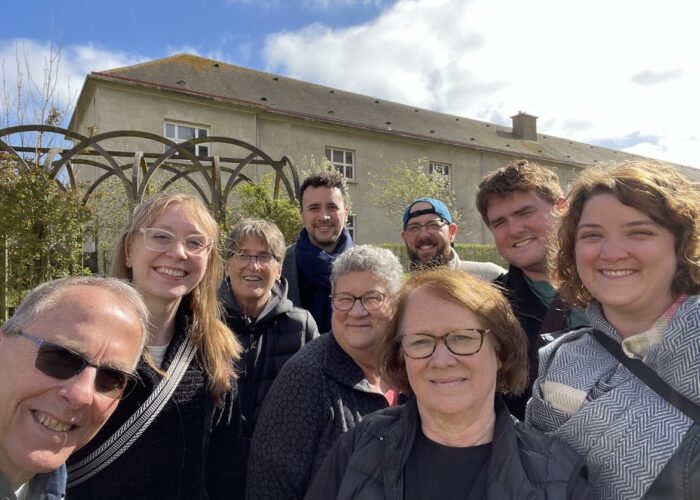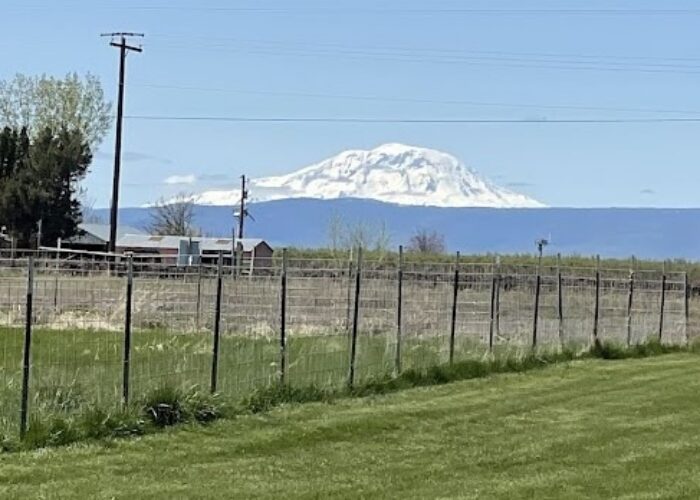BALTIMORE (Mennonite Mission Network) — When Jennifer* arrived in the United States in July 2004, she had no place to go. No way to pay a lawyer to help her gain asylum status. Some days she went without anything to eat. The new culture, language and homesickness for her mother and six younger siblings were overwhelming.
She hesitates to divulge all the details of why she fled her home in Cameroon. She says simply: “Sometimes your life is unsafe. To save your life you have to do what I did.
“Honestly, I was so mad and upset with God,” Jennifer said. “I felt like he abandoned me.”
Today she knows she wasn’t abandoned. She has found a place of belonging in the Reservoir Hill House of Peace through the Asylum Seekers Housing Network of North Baltimore Mennonite Church.
According to Fjaere Harder, a Mennonite Voluntary Service participant serving as program coordinator for the housing network, the goal of the house is to create community. That was exactly what Jennifer needed, and what she found.
House of Peace residents include MVS workers, community members committed to the mission of the house and up to four asylum seekers and refugees at a time. They share the industrial-size kitchen and cozy living room, making community impossible to avoid. Once totally alone in this city, Jennifer now lives with people who will knock on her bedroom door just to find out if she’s eaten dinner or to ask about her day.
Ruth Clemens, North Baltimore Mennonite Church member and founding member of the Asylum Seekers Housing Network, said the idea for the house came out of the desire to help refugees. She points to biblical stories of the Israelites and Jesus and even her own Anabaptist ancestors as people who needed to be welcomed in a strange land.
“As Christians we need to get out of our comfortable mode and remember there are people who don’t have a home,” Clemens said.
In 2002 the Atlantic Coast Conference, which owns the old mansion where Jennifer now lives, asked the congregation if they could use the building, formerly used to train Eastern Mennonite Mission’s short-term Youth Evangelism Service teams. The Asylum Seekers Housing Network has since provided temporary housing to 15 refugees and four asylum seekers.
Harder said government-recognized refugees are eligible to receive work permits. However, asylum seekers aren’t eligible for a work permit until asylum has been granted, leaving them with no legal means to provide for themselves.
Without North Baltimore Mennonite Church, Harder said, “the program would be based on a much more fragile network of support.” The congregation and other donors commit to pay rent and a monthly stipend for food and transportation until each asylum seeker’s request has received official approval.
Some church members like Anita Zimmerman agree to house asylum seekers in their own homes and thus become part of the housing network. In return, the guests volunteer for local nonprofit organizations.
Zimmerman lived alone before asylum seeker Nicole and baby Tim moved in.While Zimmerman sometimes misses having more time to herself, she feels that providing a stable environment for seekers facing the daunting task of applying for asylum is worth giving up a little of her privacy.
“A person cannot grow in other areas if they are worried about food and shelter,” Zimmerman said.
In addition to supplying a place to live, members of the housing network have taught English to newcomers. They’ve offered driving lessons, helped translate and provided clothing and furniture. Most of all, they extend their love.
That’s what stands out in Jennifer’s mind. When she received asylum status in June 2005 she quickly found work and began paying rent to live in Reservoir Hill House of Peace as a community member.
“If you come here you know why I stayed,” she said. “We have warm people here. They’re like my family. It’s like home.”
Jennifer grew up Catholic and continues to attend Mass because she feels comfortable praying there. But the family she’s found through North Baltimore Mennonite Church also holds a special place in her heart.
Her new family helps take the edge off the homesickness for relatives in Cameroon, though she does hope that one day her mother will be able to visit. And, if the situation ever changes, she would like to return to the land where she was born.
In the meantime, she hopes she can stay at the Reservoir Hill House of Peace for a long, long time.
Harder is a member of Bethel Mennonite Church, Mountain Lake, Minn., part of Central Plains Mennonite Conference. She is a 2005 Hesston College graduate.
*Not her real name.



